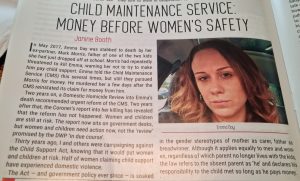Published in Women’s Fightback 26, Autumn/Winter 2021
Two years on, a Domestic Homicide Review into Emma’s death recommended urgent reform of the CMS. Two years after that, the Coroner’s report into her killing has revealed that the reform has not happened. Women and children are still at risk. The report now sits on government desks, but women and children need action now, not the ‘review’ promoised by the DWP ‘in due course’.
Thirty years ago, I and others were campaigning against the Chyild Support Act, knowing that it would put women and children at risk. Half of women claiming child support have experienced domestic violence.
The Act – and government policy ever since – is soaked in the gender stereotypes of mother as carer, father as breadwinner. Although it applies equally to men and women, regardless of which no longer lives with the kids, the law refers to the absent parent as ‘he’ and decleares his responsibility to the child met if he pays money.
It is financially precarious parents who are made to rely on CMS applications, coercing working-class women int contact with abusive ex-partners because they do not have a cushion of wealthg that can keep them at bay.
Responding to the report into Emma Day’s murder, an economic abuse charity referred to ‘the heightened risk associated with challenging male entitlement to money’. We might also consider the consequences of constructing masculinity in a way that measures men’s success by their financial status. We might reflect on a society which makes personal relationships into financial contracts, with the economic dependency that entails, and which continues to define child-rearing as a private activity by parents rather than society as a whole taking care of children.
While the government fails to reform the CMS, it shows itself as being more concerned to avoid spending money than to protect women and children.


